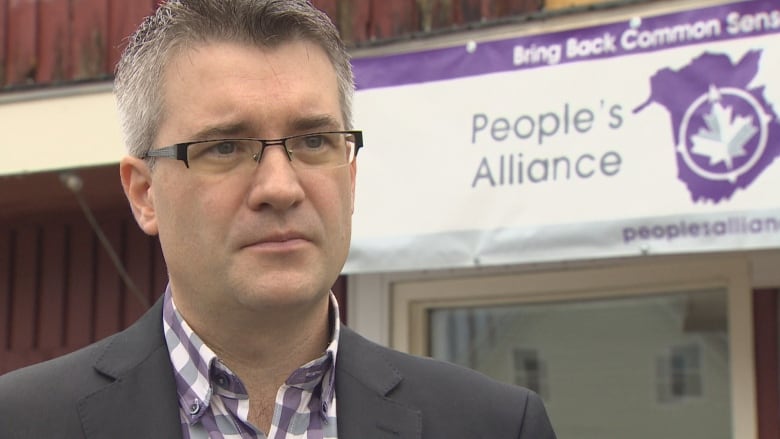Kris Austin defends himself, as Acadian voices against People's Alliance multiply
Language rights groups suspicious of Austin's 'common sense' approach, but Austin says they misunderstand

People's Alliance Leader Kris Austin believes there has been a big misunderstanding about his party's stand on language rights in the province.
The statement comes on the heels of an increasing number of voices being raised by Acadian groups, warning against a possible coalition involving the three elected Alliance MLAs.
They could hold the balance of power in a minority government.
- Francophones concerned about rise in People's Alliance support
- People's Alliance more likely to support the PCs, Kris Austin says
Liberal and Green Party leaders have also been categorical in rejecting any notion of aligning with the party, on the basis of the language elements of its platform.
So was the Conservatives' only elected francophone candidate, Robert Gauvin, who won in Shippagan-Lamèque-Miscou.
"It's just really unfortunate that that's what being perpetuated by some people out there," said Kris Austin.
"I think it's fear-mongering among some elite groups."
Says he respects French and English
Throughout the campaign, francophones have expressed shock and horror at what they perceived as their acquired rights up for debate for the first time in decades.
What we're asking for is let's apply some common sense to how we make this work."- Kris Austin, People's Alliance
The Official Languages Act was passed nearly 50 years ago by the Louis Robichaud government, giving New Brunswickers the option to receive public services in the language of their choice.
Austin campaigned on a platform that would see francophone and anglophone health authorities merge, duality in school busing end, and the office of the official languages commissioner abolished.

The party also wants to eliminate bilingual requirements for public service jobs in regions where there's no demand —something Austin said Wednesday he will not compromise on, citing ambulance wait times in rural areas.
- Mayor wonders whether teenage girl's death linked to slow ambulance
- Ambulance NB staff shortages will continue, says union president
"We're not asking to dilute minority rights," he said. "We respect the rights of both French and English in this province. What we're asking for is let's apply some common sense to how we make this work."
I think the words of 'common sense approach' is a trap, essentially.- Yvon Lapierre, Dieppe mayor
Austin, who said he was "baffled" by the comments he's heard from francophone groups since the election, believes ambulance services are in crisis, something he blames in part on bilingual requirements leaving jobs unfilled.
But he said that doesn't make him anti-francophone.
"We're saying, we'll do whatever it takes to make sure paramedics show up in a decent amount of time," said Austin.
Francophones not buying it
"That is for me bullshit," said Robert Melanson, president of the Acadian Society of New Brunswick.
"When you're against duality, you're against bilingualism, you're against everything — well you're not for the equality."
Melanson's group is one of 14 that signed a letter against any coalition scenario involving the People's Alliance.

"It would be a terrible historical error for any political party that would do that," Melanson said. "Because I think that would be a stigma that would stay on a political party."
The mayors of 19 municipalities, from Memramcook in the southeast to Edmundston in the northwest, also signed.
Dieppe Mayor Yvon Lapierre was one of them.
"I'm concerned that francophones in this province will lose rights that they have acquired over many years," said Yvon Lapierre.
"I think the words of 'common sense approach' is a trap, essentially."

Both believe bilingualism is being used as a scapegoat for the province's poor finances.
"I think there's a sense with people particularly in rural New Brunswick that they have lost something," said Lapierre. "I think it's quite to the contrary, when we look at the benefits of bilingualism that have brought to our economy locally."
He cited the example of jobs being brought with the TD call centre coming to Dieppe because of the bilingual workforce.
"Bilingualism is bringing over $1.4 billion to the province every year," Melanson said. "It's a populist party that is trying to put the economic blame on the Acadians and that is not right.
Bilingualism … is there to stay.- Robert Melanson, Acadian Society
"Bilingualism — by the way, is there to stay."
Blaine Higgs, who has worked hard to persuade francophone voters he is their ally, won the most seats on Monday night although Premier Brian Gallant will continue governing if he wins the confidence of the legislature.
Higgs has been careful not to use the word coalition, but he said he would work with other parties on a case-by-case, bill-by-bill basis.
He and Austin have not spoken since the election, according to their spokespeople.

